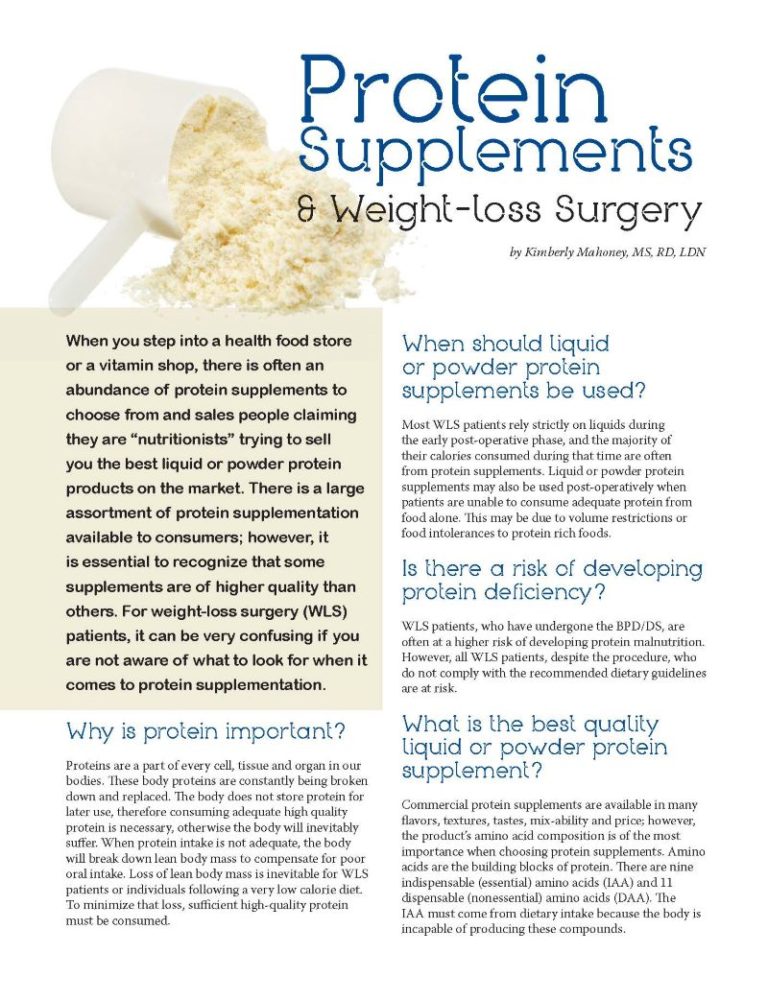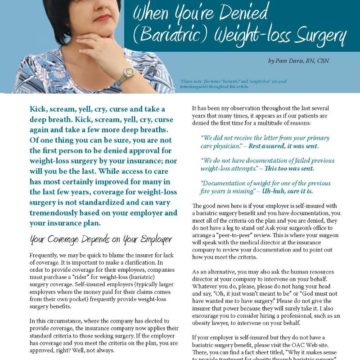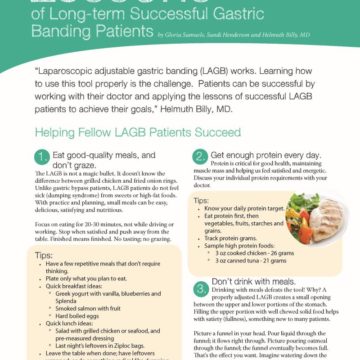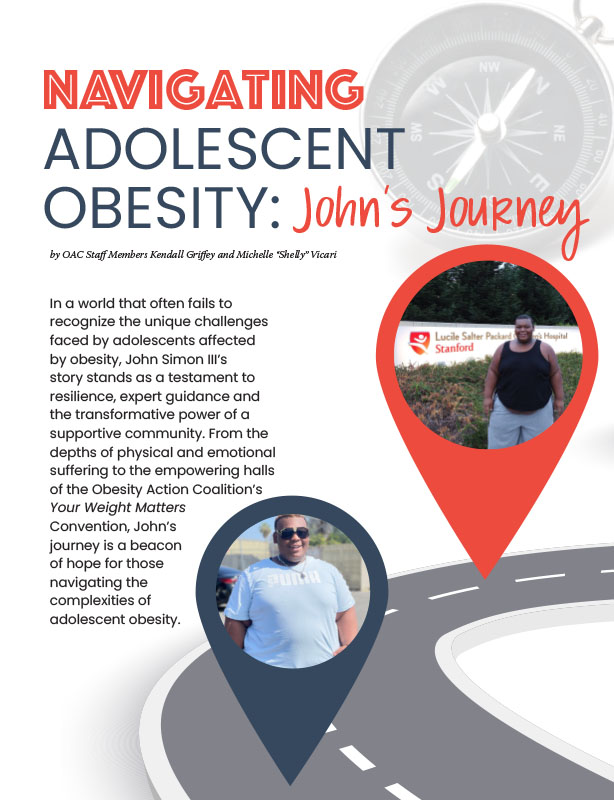Protein Supplements & Weight-loss Surgery


by Kimberly Mahoney, MS, RD, LDN
Fall 2011
When you step into a health food store or a vitamin shop, there is often an abundance of protein supplements to choose from and sales people claiming they are “nutritionists” trying to sell you the best liquid or powder protein products on the market. There is a large assortment of protein supplementation available to consumers; however, it is essential to recognize that some supplements are of higher quality than others. For weight-loss surgery (WLS) patients, it can be very confusing if you are not aware of what to look for when it comes to protein supplementation.
Why is protein important?
Proteins are a part of every cell, tissue and organ in our bodies. These body proteins are constantly being broken down and replaced. The body does not store protein for later use, therefore consuming adequate high quality protein is necessary, otherwise the body will inevitably suffer. When protein intake is not adequate, the body will break down lean body mass to compensate for poor oral intake. Loss of lean body mass is inevitable for WLS patients or individuals following a very low calorie diet. To minimize that loss, sufficient high-quality protein must be consumed.
When should liquid or powder protein supplements be used?
Most WLS patients rely strictly on liquids during the early post-operative phase, and the majority of their calories consumed during that time are often from protein supplements. Liquid or powder protein supplements may also be used post-operatively when patients are unable to consume adequate protein from food alone. This may be due to volume restrictions or food intolerances to protein rich foods.
Is there a risk of developing protein deficiency?
WLS patients, who have undergone the BPD/DS, are often at a higher risk of developing protein malnutrition. However, all WLS patients, despite the procedure, who do not comply with the recommended dietary guidelines are at risk.
What is the best quality liquid or powder protein supplement?
Commercial protein supplements are available in many flavors, textures, tastes, mix-ability and price; however, the product’s amino acid composition is of the most importance when choosing protein supplements. Amino acids are the building blocks of protein. There are nine indispensable (essential) amino acids (IAA) and 11 dispensable (nonessential) amino acids (DAA). The IAA must come from dietary intake because the body is incapable of producing these compounds.
During rapid weight-loss, when protein supplements are the main source of dietary protein intake, it is essential to choose products that contain all of the IAA. Also, it is important when choosing protein supplements that they have a score of 100 on the protein digestibility corrected amino acid score (PDCAAS). This is a system that was developed as a method to evaluate protein quality. PDCAAS scores of as close to 100 as possible are desired to indicate that it contains the appropriate amount of IAA that the body needs.
Protein supplements that are made from whey, casein, soy and egg whites have a PDCAA score of 100. It is important to recognize that many of these protein sources are sold as either concentrates or isolates.
Isolates
In general, isolates tend to have a higher concentration of protein than concentrate forms. For whey protein isolates, the filtration process removes a lot of the lactose, minerals and fat in the product; therefore, these products have very little or no lactose and often provide more protein in smaller volumes. These products may be beneficial to those patients who have lactose intolerance. Also, isolates tend to have a better mix ability and cleaner taste, therefore compliance is often better with these products.
Concentrates
Whey protein concentrates have a lower concentration of protein and higher concentration of lactose. Although the protein is of good quality, the percentage of protein will vary. Consumers can always view the nutrition label as well for accurate quantities of protein.
How much protein does the WLS patient need?
Many surgical weight-loss programs recommend between 60-80 grams of protein per day for the adjustable gastric band (AGB), vertical sleeve gastrectomy (VSG) and the Roux-en-Y gastric bypass (RYGB). The biliopancreatic diversion with duodenal switch (BPD/DS) requires approximately 90 grams of protein per-day to accommodate for the malabsorption associated with this procedure.
These recommendations are for individuals without complications (malabsorptive procedures alter digestion, thus causing the food to be poorly digested and incompletely absorbed). Those with complications will have different protein needs. The exact requirements for postoperative WLS patients with complications are not defined. It is recommended to follow-up with your surgeon and dietitian to assess protein requirements and adequate protein intake.
Protein supplements and meal replacement shakes – they are different
It is important to also recognize that there is a difference between protein supplements and meal replacement shakes (i.e. Unjury® vs. SlimFast®). Many meal replacement supplements often have a blend of soy, casein or whey protein to enhance the texture or taste of the product. Meal replacement shakes also have higher amounts of vitamin and minerals and varying amounts of carbohydrates and fiber.
One thing to consider is that meal replacement shakes are often designed to supplement a diet that includes animal and plant sources of protein. These should not be used as the sole source of protein or calories in the diet for an extended period of time.
What protein supplements should be avoided?
Collagen-based protein supplements are not a good source of high-quality protein and should not be used as the sole source of protein intake in WLS patients. Collagen-based protein supplements do not contain all of the indispensable amino acids that the body needs. When consuming collagen-based products as your sole source of protein, the loss of lean body mass can occur despite meeting your daily protein goals.
Do WLS patients need liquid or powder protein supplements for life?
As you begin to consume more food after surgery, the need for protein supplementation often declines or ceases. Relying solely on protein supplements to meet your protein needs is not recommended after the early post-operative liquid stage. Foods of high biological value are encouraged (meat, poultry, fish, eggs, milk, etc.). WLS patients who cannot meet their protein needs from food alone may benefit from supplementation of high quality protein.
What are the dangers of excessive protein intake?
If you are not well hydrated, excessive protein intake may contribute to dehydration. It is also important to remember that additional protein intake, above the recommended amount, may inhibit the consumption of other important nutrients.
Conclusion
WLS patients are going to get the best bang for their buck when they choose supplements made from whey or soy isolate and avoid whey concentrate and collagen-based products. It is also important to remember that the use of protein supplements are typically decreased or cease throughout time as the WLS patient is able to meet daily protein goals from food of high biological value.
About the Author:
Kimberly Mahoney, MS, RD, LDN, is a bariatric dietitian at St. Joseph Hospital in Chicago and has been working with weight-loss surgery patients for the past five years. She is currently the chair of the Bariatric Subunit of the Weight Management Dietetic Practice Group through the American Dietetic Association.
by Sarah Muntel, RD Spring 2024 Spring has sprung, bringing sunnier and warmer days! For many, this…
Read Articleby OAC Staff Members Kendall Griffey and Michelle “Shelly” Vicari Winter 2024 In a world that often…
Read Articleby Rachel Engelhart, RD; Kelly Donahue, PhD; and Renu Mansukhani, MD Summer 2023 Welcome to the first…
Read Article








